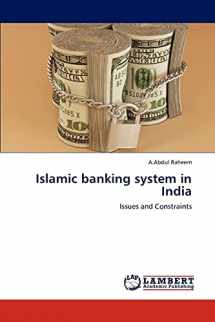
Islamic banking system in India: Issues and Constraints
ISBN-13:
9783659291210
ISBN-10:
3659291218
Author:
A. Abdul Raheem
Publication date:
2012
Publisher:
LAP LAMBERT Academic Publishing
Format:
Paperback
140 pages
FREE US shipping
Book details
ISBN-13:
9783659291210
ISBN-10:
3659291218
Author:
A. Abdul Raheem
Publication date:
2012
Publisher:
LAP LAMBERT Academic Publishing
Format:
Paperback
140 pages
Summary
Islamic banking system in India: Issues and Constraints (ISBN-13: 9783659291210 and ISBN-10: 3659291218), written by authors
A. Abdul Raheem, was published by LAP LAMBERT Academic Publishing in 2012.
With an overall rating of 3.9 stars, it's a notable title among other
books. You can easily purchase or rent Islamic banking system in India: Issues and Constraints (Paperback) from BooksRun,
along with many other new and used
books
and textbooks.
And, if you're looking to sell your copy, our current buyback offer is $0.3.
Description
In India, Islamic banking is facing hurdles. There are efforts being made to establish a full fledge Islamic bank for the inclusion of the second largest population of the country which is reluctant of interest based investments. Islamic financial institutions exist in India, in the form of Non-banking financial institutions and Muslim Funds. There is a problem of managing the workforce and there is absence of standard system of operations. India has no enough reasons to avoid the exponential growth of Islamic banking worldwide. The growth in this sector is more than the growth of normal banking system. Why not it should promote Islamic banking if it’s promising sustainable development with many other advantages. The proponents of the interest free banking and finance have to prove the benefits by empirical data. The level of discourse would be at a new height if empirical studies prove the comparative advantage of Islamic banking. Therefore it could be concluded that at a time when India has adopted the policy of throwing open the Banking sector to foreign players, permitting Islamic Banks and Islamic windows in commercial banks would attract more foreign capital to the country.


We would LOVE it if you could help us and other readers by reviewing the book
Book review

Congratulations! We have received your book review.
{user}
{createdAt}
by {truncated_author}


